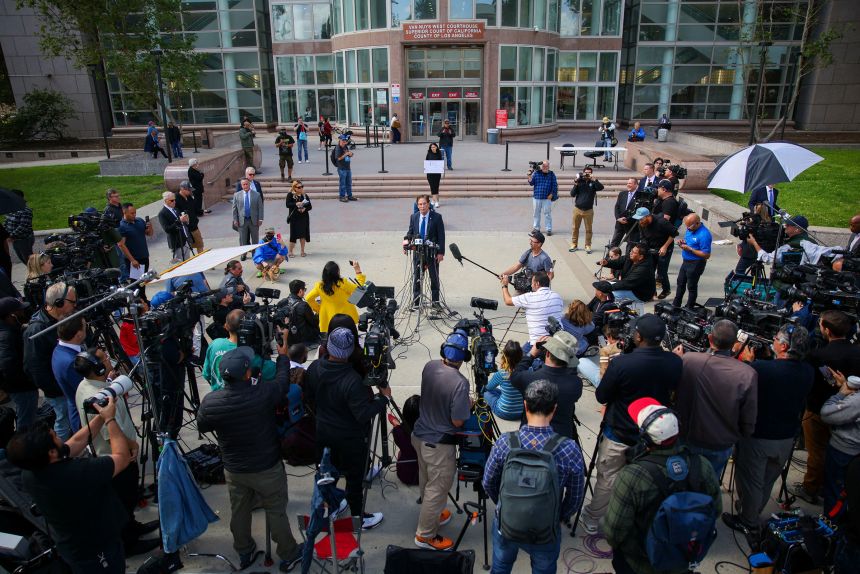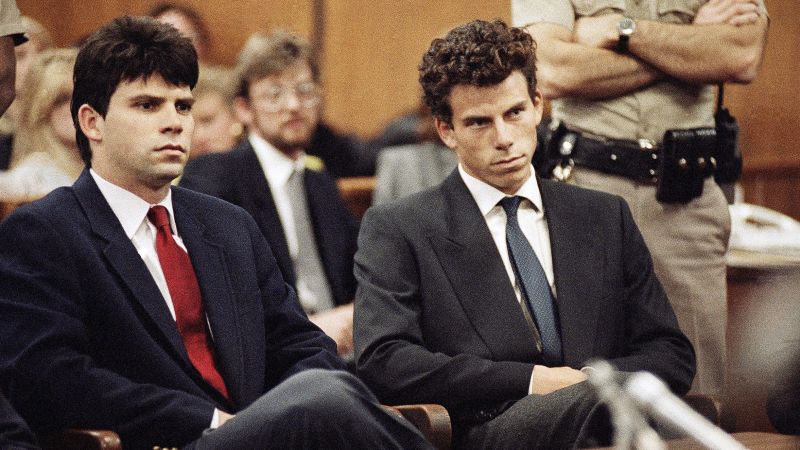Nearly three decades after Erik and Lyle Menendez were sentenced to life in prison for the murders of their parents, a California judge has reopened a door many believed would remain closed.
In a stunning ruling on Tuesday, Los Angeles County Superior Court Judge Michael Jesic reduced the brothers’ sentences from life without parole to 50 years to life – making them eligible for parole.
The ruling is the latest twist in a case that has captivated America for decades, with an army of attorneys, family members and online supporters in recent years launching a renewed campaign for the brothers’ freedom, fueled in part by a wave of attention brought by a docuseries and a Netflix drama series recounting the case.
Here’s what we know:
Lyle Menendez, 57, and his brother Erik Menendez, 54, have spent most of their adult lives behind bars for the murders of their parents, Jose and Kitty Menendez, at the family’s Beverly Hills home in 1989.
The brothers, who were aged 21 and 18 when they carried out the fatal shootings, were convicted of first-degree murder in a 1996 trial, more than two years after separate juries had failed to reach a verdict in their original trials.
The brothers admitted to the murders but have argued they acted in self-defense following years of sexual abuse by their father. Prosecutors claimed the killings were driven by the brothers’ desire for a multi-million-dollar inheritance.
Jesic’s ruling means the Menendez brothers are immediately eligible for parole under California law because they committed the murders while under the age of 26.
The judge said that although the brothers had committed a horrific crime, they deserved “a lot of credit for changing their lives.”
A letter from a prison official in support of resentencing was especially moving, the judge said.
The brothers had launched numerous prison programs, including a support group for disabled and elderly inmates, and raised more than $250,000 for a prison beautification initiative, previous court filings said.
“I’m not saying they should be released, it’s not for me to decide,” Jesic said, adding, “one day they should get that chance.”
“It’s now up to the parole board and the governor of California,” he said.
The brothers now have at least two potential paths to freedom: parole, made possible by Tuesday’s resentencing; or clemency, for which they had already petitioned the governor. Both paths would involve the state parole board, and then Gov. Gavin Newsom for the ultimate decision.
A parole board hearing was already scheduled for June 13 as part of that previous clemency request. Newsom had asked the board to consider and report back on whether the brothers would pose an unreasonable risk to public safety if released.
It’s not clear whether the June 13 hearing will also serve as a hearing for parole, or whether that would require a separate proceeding. CNN has reached out to the California Department of Corrections and Rehabilitation, which did not immediately provide clarification.
In the case of parole, the board could either deny the brothers’ request or recommend to the governor that parole be granted. If the board were to recommend parole, Newsom would have 120 days to act.
As for the board’s consideration in the clemency petition: Psychological evaluations of each brother have already been conducted, according to details that emerged during the brothers’ resentencing hearing.
CNN has reached out to the governor’s office and the state parole board for comment on Tuesday’s resentencing.
The resentencing and the clemency request weren’t the only legal avenues being pursued by the brothers to secure their release. They also had filed a habeas corpus petition seeking a new trial.

Dozens of Menendez relatives say Erik and Lyle have demonstrated years of remorse and rehabilitation since killing their parents. They also argue the severity of the sentence should be revisited due to a deepened cultural understanding of childhood sexual abuse since the murders.
The brothers’ bid for release received renewed impetus in 2023 when a former member of the boy band Menudo publicly accused Jose Menendez — then a top RCA Records executive — of raping him in the mid-1980s.
In recent months, supporters from across the country have gathered at rallies and hearings advocating for the brothers’ release.
They say prosecutors and the media overlooked the abuse claims and framed the brothers as arrogant, self-entitled heirs to their parents’ $14 million estate during their trials in the 1990s.
Diane Hernandez, a cousin who lived with the Menendez family, testified Tuesday about Jose’s intimidation, including a strict “hallway rule” that barred others from his time with the brothers.
“Please be merciful,” she urged, calling the brothers “remarkable human beings at this point.”
“I am touched and humbled by the outpouring of support,” Erik Menendez said in a statement released to ABC News Tuesday night following the ruling.
“This has to be the first step in giving people who have no hope in prison some hope,” he said. “My goal is to ensure there are no more people spending 35 years in prison without hope. That possibility of having hope that rehabilitation works is more important than anything that happened to me today.”
Earlier Tuesday, the brothers said they took “full responsibility” for the murders as they appeared before the judge remotely from prison.
“I committed an atrocious act against two people who had every right to live, my mom and dad,” Erik said, adding that he “created a crushing sadness” for his family and there was “no excuse” for his behavior.
“I will never stop trying to make a difference whether I am inside or outside of prison,” he said.
Lyle also admitted to killing his parents, saying he “was immature” and “filled with rage.” “Had I trusted others to help me, I wouldn’t have committed these crimes,” he said. “I didn’t think anyone would believe me about my sexual abuse.”

Critics argue the murders were calculated acts of greed, rather than acts of desperation by abuse victims.
While the brothers’ case was championed by the former Los Angeles County district attorney, his successor, Nathan Hochman, has taken a more hardline stance against their release.
“The decision to resentence Erik and Lyle Menendez was a monumental one that has significant implications for the families involved, the community, and the principles of justice,” Hochman said in a statement on Tuesday evening. “Our office’s motions to withdraw the resentencing motion filed by the previous administration ensured that the Court was presented with all the facts before making such a consequential decision.”
Earlier Tuesday, Hochman told CNN the brothers had “fabricated” abuse claims and should first take responsibility for their actions before seeking parole.
“If and when they do, they’ll be ready for resentencing,” he said.
Hochman also pointed to the recent finding of risk assessments conducted by the state parole board that the brothers would pose a “moderate” risk of violence if released.

